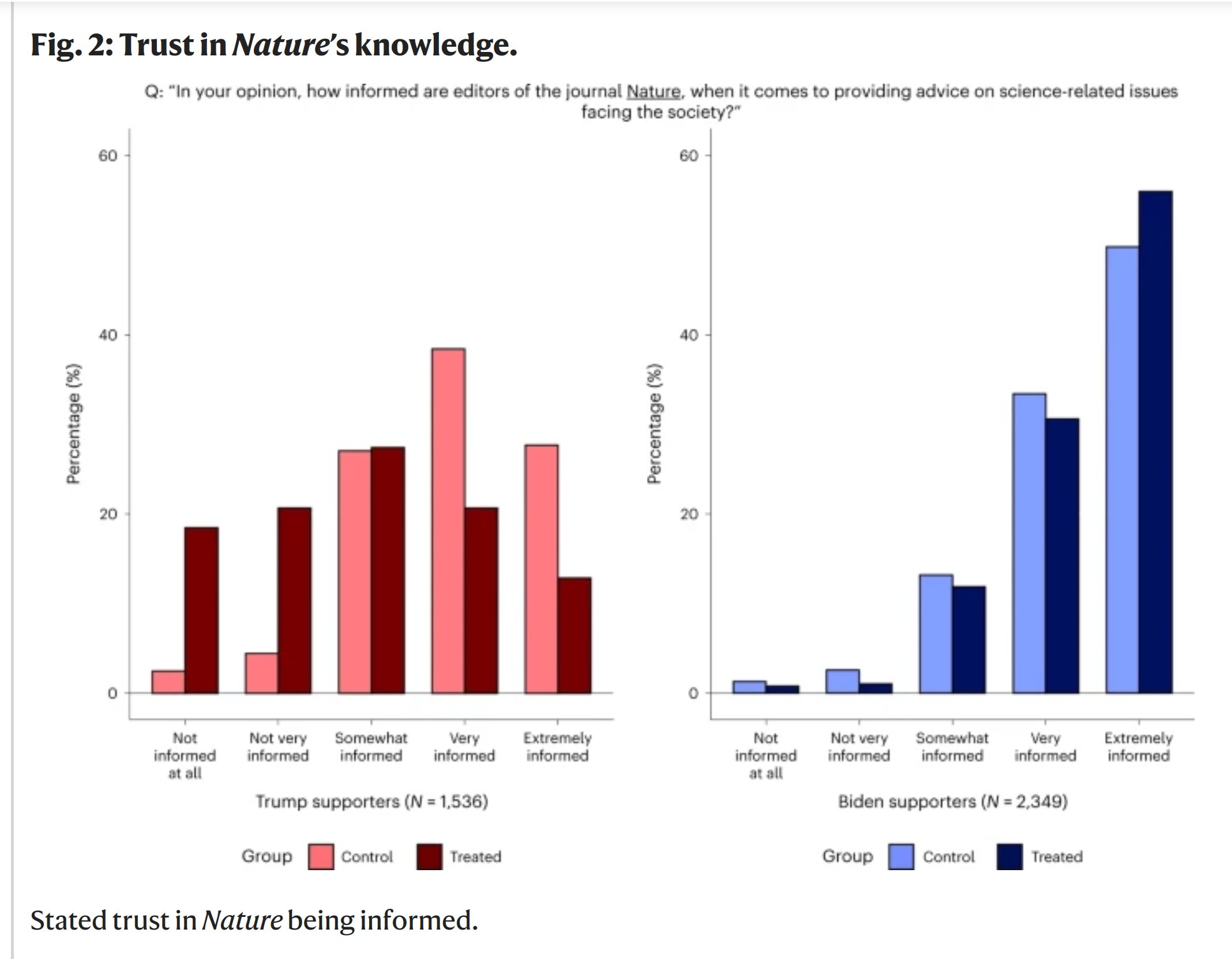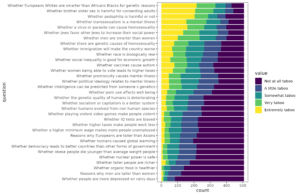There’s a new bombshell paper out finding some very obvious findings:
-
Zhang, F. J. (2023). Political endorsement by Nature and trust in scientific expertise during COVID-19. Nature Human Behaviour, 1–11. https://doi.org/10.1038/s41562-023-01537-5
High-profile political endorsements by scientific publications have become common in recent years, raising concerns about backlash against the endorsing organizations and scientific expertise. In a preregistered large-sample controlled experiment, I randomly assigned participants to receive information about the endorsement of Joe Biden by the scientific journal Nature during the COVID-19 pandemic. The endorsement message caused large reductions in stated trust in Nature among Trump supporters. This distrust lowered the demand for COVID-related information provided by Nature, as evidenced by substantially reduced requests for Nature articles on vaccine efficacy when offered. The endorsement also reduced Trump supporters’ trust in scientists in general. The estimated effects on Biden supporters’ trust in Nature and scientists were positive, small and mostly statistically insignificant. I found little evidence that the endorsement changed views about Biden and Trump. These results suggest that political endorsement by scientific journals can undermine and polarize public confidence in the endorsing journals and the scientific community.
Who would have thunk?? The general population understands that various groups in society have different goals, and all of them have some good dose of self-serving bias. So when scientists say that X is true, and the job of scientists is to find and report the truth, you still have to ask yourself: Yes, but, does this benefit themselves in some way? Is this just pushing their political goals covertly? As it happens, this is often the case. Nathan Cofnas et al set out to make this point about 5 years ago:
- Cofnas, N., Carl, N., & Woodley of Menie, M. A. (2018). Does activism in social science explain conservatives’ distrust of scientists?. The American Sociologist, 49, 135-148.
Data from the General Social Survey suggest that conservatives have become less trustful of scientists since the 1970s. Gauchat argues that this is because conservatives increasingly see scientific findings as threatening to their worldview. However, the General Social Survey data concern trust in scientists, not in science. We suggest that conservatives’ diminishing trust in scientists reflects the fact that scientists in certain fields, particularly social science, have increasingly adopted a liberal-activist stance, seeking to influence public policy in a liberal direction.
So in this sense, the general population shows reasonable common sense. When someone is telling a too rosy story of something, you start to wonder if he’s also selling that very something.
Scientists, of course, are unusually low in common sense and high in in-group bias, so they do tweets like this one:
Here we should tell the good science man how it works: You are exactly correct! Scientists are like children. They live in a dream world where money flows from nowhere to them (i.e. de facto socialism), they produce mostly nothing of value (most science is useless junk, doesn’t even replicate), but they brag all the time about their importance, always want more influence, and there’s never enough funding for themselves their sector of the economy (education). Hard to find a more narcissistic group except — maybe — for journalists (“democracy dies in darkness”).
So, really, I am actually very happy that guys like Holden Thorp are pushing for explicitly signaling their political ideology and thus reducing the public’s’ trust in them. In the last 100 years or so, scientists had instead been playing a two-faced covert game where nearly all of their activism was egalitarian but up front they would pretend they were about objectivity and peer-review quality etc. Now the mask is off. So I suggest they keep going down this path. More inane political signaling in science magazines! Talk about how great life in USSR DDR Cuba Venezuela Maoist China ??? is, how you need more LGBTQ+ people in power, how bad the free market is — accelerate! The hopeful end-game of this approach is that the always asleep at the post conservative leaders will largely defund the universities for the adult playgrounds they are.
Extra
“Do you really want to shut down universities?” No, but I would like to scale them back, say, 80%. Of the 80% you cut off, remove all the fluff insofar as possible. Remove all the fake studies (Chicano studies, feminist dance, anything *structuralism*), most of sociology (mostly a socialist front), most of anthropology (not even trying to be sure, according to their own member surveys) and so on. Higher education is mostly a waste of time and money that academics self-servingly promote. Conservative leaders are maybe too stupid to understand this, but if the socialists push hard enough, conservative leaders can maybe understand that higher education is a de facto socialist front. The funding for the real sciences can be kept, just get rid of the various socialist fronts inside them (anything about ‘marginalized groups’). If your job depends on public funding, you better to an angel of impartiality.



